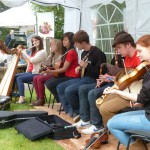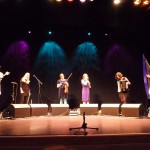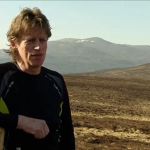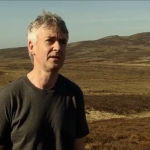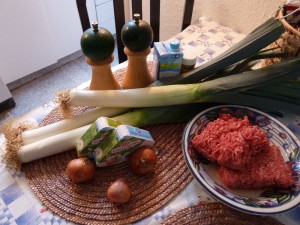 Brot creamh-gàrraidh le mions is càise
Brot creamh-gàrraidh le mions is càise
Seo reasabaidh Gearmailteach dhuibh a fhuair mi bho mo charaid Inge à Bonn. Bha mi air cèilidh oirre aon nochd-gheamhraidh fhuar an-uiridh agus bha am brot seo na deagh shiupear às dèidh latha fhada agus slighe sgìtheil, cho blasta ‘s cho teth gun do dh’fhuirich e nam chuimhne. Agus a-nis, far a bheil na làithean geamhraidh againn a-rithist, thàinig e a-steach orm gum bu chòir dhomh feuchainn ri a dhèanamh mi-fhìn.
Gritheidean (4 pòrsanan matha)
500gr. mions mairt-fheòil
3 creamhan-gàrraidh meadhanach
1 uinnean
700 ml. sùgh-glàsraich
100 – 150 gr. càise giullaichte simplidh
100 – 150 gr. càise giullaichte le lusan
(Na cleachd càise bog nàdarra. Bidh e a’ binndeachadh!)
salann, piobar dubh, cnò-mheannt sgrìobte, beagan uachdair
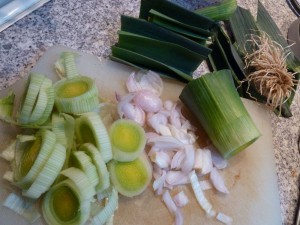 Cuir am mions beag air bheag ann am pana trom gun ola, agus feuch am bi e a’ fàs donn agus sgaoilte, gun chnapan, mar chriomagan.
Cuir am mions beag air bheag ann am pana trom gun ola, agus feuch am bi e a’ fàs donn agus sgaoilte, gun chnapan, mar chriomagan.
Anns an eadar-àm, geàrr na creamhan nan slìseagan agus an t-uinnean na phìosan beaga.
Cuir iad ris a’ mhions, fuirich mionaid no dhà gus am bi an t-uinnean glainneach soilleir, agus cuir an sùgh, an salann, gu leòr de phiobar, agus a’ chnò-mheannt ris.
Bruich air a shocair e gus am bi an creamh-gàrraidh bog, mu 20 mionaid, agus cuir an càise ris na phìosan beaga.
Cuir mun cuairt a h-uile rud gus am bi an càise air leaghadh.
Cuir làn na lèigh anns gach soitheach agus làn spàine uachdair air, ma thogras tu.
– Deiseil!
Ith le aran cruasbach e.
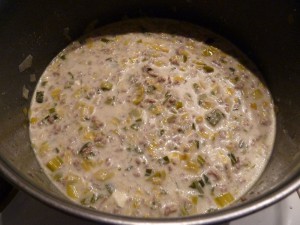 Tips:
Tips:
– Ma bhios tu ag ullachadh a’ bhrota ro làimh, na cuir an càise ris gus am bi thu ga ath-bhlàthachadh.
– Mura cuir thu uiread de shùgh ann, faodaidh tu am brot a chleachdadh mar shabhs le pasta no bùntata pronn.
– Le uireadan dùbailte tha am brot glè fhreagarrach do thachartasan leithid chèilidhean – faodaidh tu dìreach barrachd sùgh-ghlasraich a cuir ris mur a h-eil gu leòr ann….
****************************************************************
Leek soup with mince and cheese
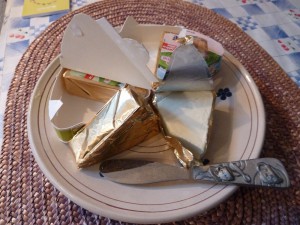 Here’s a German recipe for you that I got from my friend Inge from Bonn. I was visiting her one cold winter’s night last year, and this soup made a great supper after a long day and a tiring jouney, so tasty and warming that it stayed in my memory. And now that the winter days are upon us again, it ocurred to me that I should try to make it myself.
Here’s a German recipe for you that I got from my friend Inge from Bonn. I was visiting her one cold winter’s night last year, and this soup made a great supper after a long day and a tiring jouney, so tasty and warming that it stayed in my memory. And now that the winter days are upon us again, it ocurred to me that I should try to make it myself.
Ingredients (4 good-sized portions)
500 gr. beef mince
3 medium leeks
1 onion
700 ml. vegetable stock
100 – 150 gr. plain soft processed cheese (like Dairylea)
100 – 150 gr. soft processed cheese with herbs
(Don’t use fresh soft cheese or it’ll curdle!)
salt, black pepper, grated nutmeg, a little cream to garnish
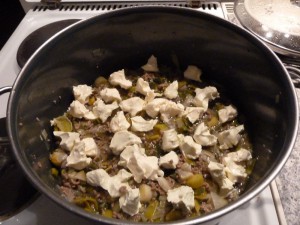 Put the mince bit by bit into a heavy pan to brown, without oil. Keep it loose, without lumps, like crumbs.
Put the mince bit by bit into a heavy pan to brown, without oil. Keep it loose, without lumps, like crumbs.
Meanwhile slice the leeks and chop the onion.
Add them to the mince, wait a few minutes till the onion turns clear and glassy, then add the stock, the salt, plenty of pepper, and the nutmeg.
Simmer till the leek is soft, about 20 minutes, then add the cheese in little chunks.
Stir it all until the cheese has melted.
Put a ladleful in each bowl and optionally a spoonful of cream on top as garnish.
Ready!
Eat with crusty bread.
Tips:
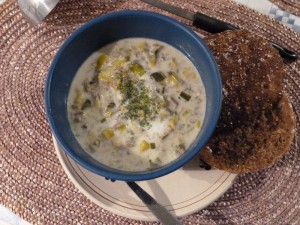 – If you’re making the soup in advance, only add the cheese before you warm it up.
– If you’re making the soup in advance, only add the cheese before you warm it up.
– If you don’t put in as much stock, you can use the soup as a sauce with pasta or mashed potato.
– With double quantities the soup is perfect for events like parties – you can just add more stock if there’s not enough soup to go round…
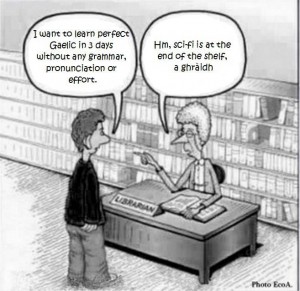
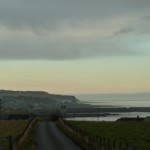
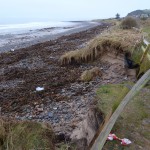
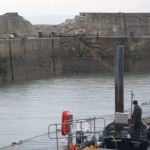
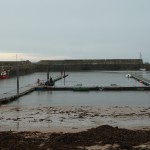
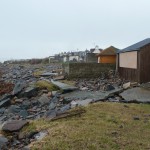
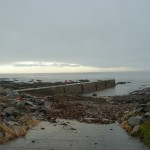
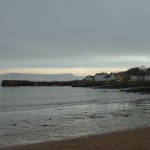
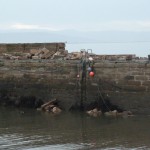
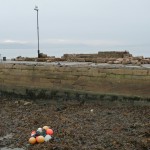
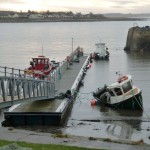
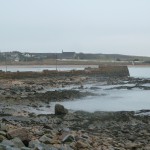
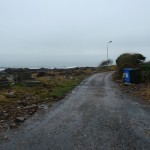
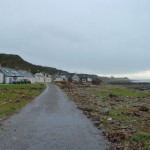
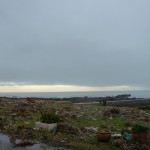


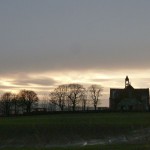


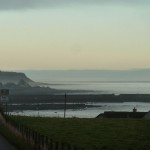
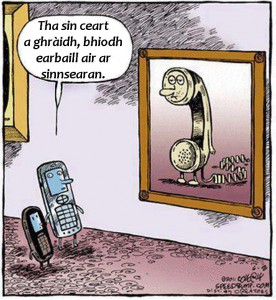
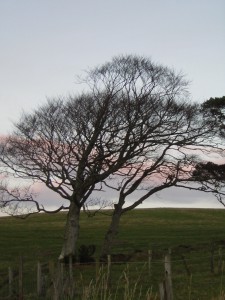
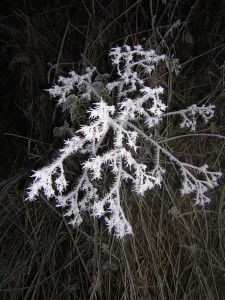
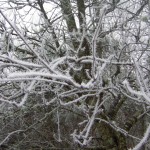
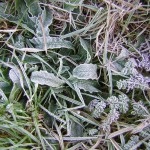
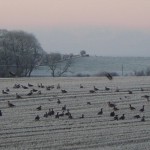
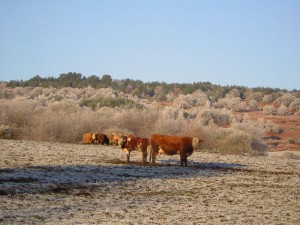
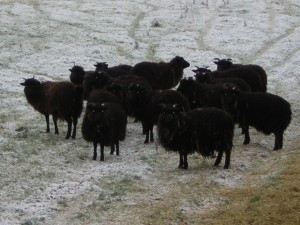
 Tha leabhar ùr ann cuideachd, le abairtean Gàidhlig airson nam Fèisean (conaltradh is faclan-ciùil) agus ceòl, agus CD an cois
Tha leabhar ùr ann cuideachd, le abairtean Gàidhlig airson nam Fèisean (conaltradh is faclan-ciùil) agus ceòl, agus CD an cois